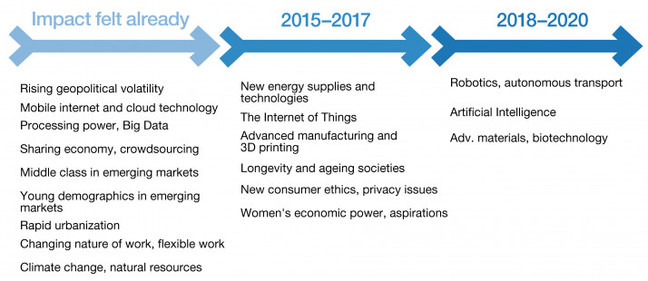This article is more than 1 year old
Robots. Machine learnin', 3D-printin' AI robots: They'll take our jobs – Davos
World Economic Forum scariness
Robot overlords will cause a net loss of over five million human jobs by 2020, according to analysis by the World Economic Forum (WEF) from Switzerland's Davos ski resort.
Dubbed the Fourth Industrial Revolution, a mixture of artificial intelligence, machine learning, robotics, nanotechnology and 3D printing – when combined with advances in genetics and biotechnology and significant demographic changes – will "transform the labour markets in the next five years", stated The Future of Jobs report published by the WEF today.
In total, 7.1 million jobs will be lost to the machines, whether through redundancy, automation or disintermediation (cutting out the middle men), with office and admin roles set to be hit hardest.
Partially offsetting this will be around two million new roles which should likely arrive in the "job families" of computing and mathematics, architecture and engineering.
For the survey, the writers quizzed chief human resource officers (CHROs) and "other senior talent and strategy executives" who represent employers with over "13 million employees across nine broad industry sectors in 15 major developed and emerging economies and regional economic areas".
The 15 economies included the UK, which is one of the few nations which will see a net increase in jobs over the period with a relatively low 28 per cent of the top skills mix expected to change by 2020.

Source: Future of Jobs Report, World Economic Forum
“Without urgent and targeted action today to manage the near-term transition and build a workforce with future proof skills, governments will have to cope with ever-growing unemployment and inequality, and businesses with a shrinking consumer base,” said Klaus Schwab, Founder and Executive Chairman of the World Economic Forum.
Women are set to be hit hardest by the developments. While the burden of job losses falls equally between women and men in absolute terms, as men represent a larger share of the overall job market than women this even spread translated into "a widening of the employment gender gap, with women losing five jobs for every job gained compared with men losing three jobs for every job gained".
This is also partly explained by the low participation by women in the “job families” that are expected to grow, such as computers and mathematics, thus adding to the urgency with which leaders must address the chronic problem of getting more women into STEM (science, technology, engineering, mathematics) professions.
Talking to their surveyors, CHROs lamented the popular vagueness on exactly what disruption is underway. WEF stated its dataset aimed to deliver specifics to those employers who "are among those at the frontline of the emerging trends and are key actors in implementing future workforce strategies".
“Our analysis reveals that upcoming disruptions to the employment landscape will be about much more than simply automation. It is essential that we act collectively now to prepare ourselves for the changes that we know the Fourth Industrial Revolution will bring,” said Saadia Zahidi, head of the Global Challenge on Employment, Skills and Human Capital, at the World Economic Forum.
Businesses themselves will need to take responsibility for "up-skilling" and "re-skilling" their workforce, concluded the WEF, adding "it is imperative that governments put in place rapid and fundamental change in education systems to prepare for the new labour market".
The outlook isn't all that dark, however. The most popular strategy across industries is in investing in reskilling current employees. WEF stated: "Other practices, such as supporting mobility and job rotation, attracting female and foreign talent, and offering apprenticeships, also scored high." ®
